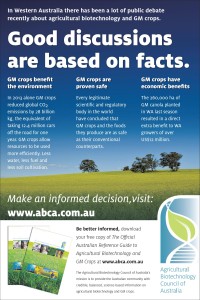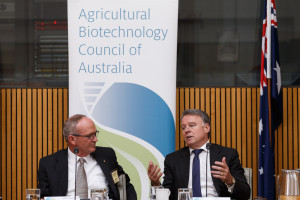Quarterly Update – Edition 7
Quarterly Update
Edition: 7
- COUNCIL ACTIVITY
- KEY ISSUES
- IN THE PIPELINE
- RESOURCES
- FOR INFORMATION
- EVENTS
COUNCIL MEETING HELD AT PARLIAMENT HOUSE
The ABCA Council is a forum for member organisations to discuss local and international emerging issues, and review current ABCA initiatives. ABCA does not advocate but exists to provide the public, particularly farmers, with credible, balanced, science-based information on biotechnology, in order to enable them to make informed decisions about the application, uses and future of gene technology in Australia. The Council helps ensure that resources are relevant and made available in a timely manner in order that public debate is informed.
ABCA’s first Council Meeting for 2015 was held at Parliament House on 25 March. The meeting was opened by the Hon. Michael McCormack MP, Parliamentary Secretary to the Minister for Finance and Nationals Member for Riverina, and it was addressed by the Shadow Minister for Agriculture, the Hon. Joel Fitzgibbon MP.
Members of the House of Representatives Standing Committee on Agriculture and Industry, and Senate Standing Committee on Rural and Regional Affairs and Transport joined the Council for lunch.
The Hon. Michael McCormack addresses the ABCA Council Meeting at Parliament House.
ABCA Chairman, Ken Matthews AO, and Shadow Minister for Agriculture, the Hon. Joel Fitzgibbon MP during the ABCA bi-annual Council Meeting.
Items on the agenda included discussion on the Agricultural Biosciences International Conference (ABIC) to be held in Melbourne in September, ABCA’s work program, the launch of the second edition of The Official Australian Reference Guide to Agricultural Biotechnology and GM Crops, and emerging issues including international developments in agricultural biotechnology.
Further information:
ABCA SPONSORS SCIENCE MEETS PARLIAMENT
For the second consecutive year, ABCA sponsored an event at Science Meets Parliament – the Farewell Cocktail function hosted by the Parliamentary Friends of Science. ABCA Chair Mr Ken Matthews AO, opened the event and copies of The Official Australian Reference Guide to Agricultural Biotechnology and GM Crops (Second Edition) were provided to all attendees.
The 200 conference delegates also received a copy of the Guide in conference satchels.
ABCA Chairman, Ken Matthews, AO, speaking at the Science Meets Parliament Cocktail Function hosted by ABCA.
The Science Meets Parliament Cocktail Function hosted by ABCA was a well-attended event.
Further information:
ABCA LAUNCHES UPDATED PUBLICATION
Following the success of the 2014 Official Australian Reference Guide to Agricultural Biotechnology and GM Crops, ABCA has launched a revised and updated second edition to coincide with Science Meets Parliament 2015.
The updated booklet provides factual information about GM crops based on scientific evidence. Topics covered include the science, performance, safety and regulation of GM crops as well as products in the pipeline and the commercial and market realities. The Guide also gives a voice to farmers actually using GM crops and answers some common questions regarding stockfeed, the organisations involved in GM crop research, and food safety.
Over the past 19 years over 4.5 billion acres of GM crops have been planted across 20 developing and eight industrialised countries representing more than 60 per cent of the world’s population. This 100-fold increase makes GM crops the fastest adopted crop technology in recent times.
Despite the widespread adoption by farmers, the technology continues to stimulate considerable community debate. Through the Guide, ABCA aims to inform the debate by providing factual information that is supported by a scientific panel of independent experts.
An electronic version is available on the ABCA website.
Further information:
- [email protected]
- abca.com.au/materials/booklets/
- abca.com.au/media-releases/abca-launches-second-edition-of-gm-guide-at-parliament-house/
ABCA ADVERTISMENT – GOOD DISCUSSIONS ARE BASED ON FACTS
On April 10, page two of the West Australian featured an promoting informed discussion about GM crops in Western Australia. The advertisement highlighted that GM crops benefit the environment, are proven safe and have economic benefits. It also encouraged interested readers to download a free copy of The Official Australian Reference Guide to Agricultural Biotechnology and GM Crops from the ABCA website.

Further information:
NEWS BITES
ABCA provides a weekly summary of biotechnology news developments for subscribers. Contact ABCA to be added to the distribution list.
Further information:
FOLLOW ABCA ON TWITTER
ABCA is on twitter at @info_ABCA.
ABCA also participated in the agchatoz twitter discussion on the use of agricultural biotechnology in Australia. The discussion focused on whether biotechnology developments in agricultural were positive or negative; how Australian farmers currently use biotechnology on their farms; coexistence; and, the validity of concerns about growing GM crops.
Further information:
MARSH V. BAXTER: APPEAL UPDATE
On 23 and 24 March, the appeal of the case between two farmers, Steve Marsh and Michael Baxter, was heard in the Supreme Court of Western Australia. Kojonup organic farmer Steve Marsh was appealing against a finding in favour of his GM-cropping neighbour, Michael Baxter, from last year. It emerged during the proceedings that the grounds of the appeal presented by Mr Marsh’s legal team were that Mr Baxter had a greater duty of care to protect Mr Marsh’s organic certification, in particular, that Mr Baxter should have considered the risk of the swathes blowing onto his neighbour’s farm.
Mr Baxter’s legal team told the court that he could not have known the canola swathes would be carried by the wind or lead to the decertification of Mr Marsh’s organic wheat crop, as the organic crop was far away from the canola swathes; Mr Marsh did not grow organic canola; and, Mr Marsh himself could have moved his crop away from the boundary.
The legal team representing Mr Marsh also appealed the costings order whereby Justice Martin had previously ordered Mr Marsh cover the costs of Mr Baxter estimated at more than $800,000. The Judges hearing the appeal ordered Mr Baxter to disclose, within 14 days, any financial help he may have received from industry sources. No date has been given for the outcome of the appeal to be announced.
Monsanto Australia has since supplied documentation to the appeal court that outlines Monsanto’s indemnity agreement with Mr Baxter. Monsanto Australia released a statement saying the legal dispute between the two farmers had been difficult for the families and communities involved and it was “regrettable that neighbours and friends ended up in court”.
Managing Director, Mr Daniel Kruithoff, said Monsanto Australia had contributed to the Baxter’s legal costs to ensure they could defend themselves in court. He said Monsanto’s indemnity agreement with the Baxters “strictly limited its support to contributing to their legal costs”. “Monsanto had no control over the management of the case,” he said.
“We have not previously disclosed our support for the Baxters so that this legal dispute remained focused on the factual and legal issues of the case. It was only fair that the Baxters received much needed support given the extensive fundraising efforts of Steve Marsh’s supporters.”
“We are passionate about farming and our customers and we care about their wellbeing which is why we provided the Baxters with support to defend themselves.”
“Organic, conventional and GM crops have been grown side-by-side in Australia for many years, which has contributed to the competitiveness and sustainability of local farmers and Monsanto expects this to continue.”
The story of the community and the families involved in the Marsh v. Baxter case was the subject of a two-part Australian Story titled, The Seeds of Wrath, in March. See: www.abc.net.au/austory/
For further information:
- farmonline.com.au/news/agriculture/cropping/general-news/gm-appeal-rests-on-duty-of-care/2727340.aspx
- abc.net.au/news/2015-03-24/gm-damages-appeal-hearing-day-two/6344624
- abc.net.au/news/2015-03-25/gm-appeal-sees-farmer-ordered-to-reveal-financial-help/6347468
- farmonline.com.au/news/agriculture/agribusiness/general-news/baxters-defence-funded-by-monsanto/2728924.aspx
GM CROP UPTAKE CONTINUES
In January, the International Service for the Acquisition of Agri-Biotech Applications (ISAAA) released the annual statistics about the growth of GM crops around the world, announcing that 181.5 million hectares of GM crops were grown across 28 countries in 2014.
The USA dominates global growth, and GM herbicide tolerance dominates the traits available, but ISAAA identified a number of new countries looking to enter the GM crop production arena and new traits in the pipeline. For example:
- Bangladesh, one of the smaller and poorest countries in the world, approved and commercialised Bt brinjal (eggplant) in 2014.
- Vietnam and Indonesia are moving towards planting their first GM crops in 2015. Vietnam approved GM maize (herbicide tolerant and insect resistant) and Indonesia approved a drought tolerant sugarcane for food, whilst approval for feed is pending.
- In 2014, the USA approved two new GM crops for commercialisation in 2015. The Innate™ potato, the fourth most important food staple in the world, with lower levels of acrylamide, a potential carcinogen, and less wastage due to bruising; and reduced lignin lucerne (alfalfa) to be marketed as HarvXtra™ with higher digestibility and higher yield.
- In the USA, last year saw the adoption of GM drought tolerant maize increase to 275,000 hectares from 50,000 hectares in 2013.
- Improved herbicide tolerant GM technologies were also approved in the USA, so-called second generation products.
- According to the report, Brazil will launch a GM herbicide tolerant soybean and a home-grown virus resistant bean in 2016.
In 2014, 7.1 million smallholder farmers in China successfully planted 3.9 million hectares of GM cotton at an adoption rate of 93 per cent of its 4.2 million total cotton hectarage. In addition, approximately 8,500 hectares of virus resistant papaya were planted and about 543 hectares of insect resistant GM poplar trees. In the shorter term, ISAAA predicts GM maize (insect resistant, herbicide tolerance and high phytase) will be commercialised in China, with insect resistant rice coming in the longer term. ISAAA believes that the arrival of these crops in the marketplace will have momentous implications for China, Asia, and the rest of the world, because rice is the most important food staple, and maize the most important feed crop in the world.
As of the end of October 2014, a total of 38 countries (37 + EU – 28) have granted regulatory approvals to GM crops for use as food, feed or for environmental release since 1994.
For further information:
GM APPLES AND POTATOES APPROVED FOR USA RELEASE
The US Department of Agriculture’s (USDA) Animal and Plant Health Inspection Service (APHIS) has approved apples that are genetically modified to resist browning for commercial release. The regulators concluded, “the GE apples are unlikely to pose a plant pest risk to agriculture or other plants in the United States.”
The US Food and Drug Administration has also evaluated the GM apple varieties and six varieties of GM potatoes and concluded that these foods are as safe and nutritious as their conventional counterparts.
The Arctic® apples have been modified to produce less of the substance that causes browning. When these apples are sliced or bruised, the apple flesh retains its original color longer instead of turning brown.
Okanagan Specialty Fruits, the company responsible for bringing the GM apple to the market has stated that it will likely be 2016 before any Arctic Granny or Arctic Golden apples are available for small, test-markets. Following that, they expect increasing amounts of fruit each year, including additional non-browning varieties like Arctic® Gala and Arctic® Fuji.
Since these approvals have been announced, Okanagan Specialty Fruits has been bought out by a US-based synthetic biology company Intrexon. The GM apple developer was bought for $31 million in stock and $10 million in cash, which will be split among its 45 investors. Intrexon is also a majority owner in AquaBounty Technologies, which has developed the GM salmon, and Trans Ova Genetics, which provides reproductive technologies to the livestock industry.
The potatoes, Simplot’s varieties of Ranger Russet, Russet Burbank and Atlantic potatoes are collectively known by the trade name “Innate” and are genetically modified to reduce the formation of black spot bruises by lowering the levels of certain enzymes in the potatoes. In addition, they are modified to produce less acrylamide by lowering the levels of an amino acid called asparagine and by lowering the levels of reducing-sugars. Acrylamide is a chemical that can form in some foods during high-temperature cooking, such as frying, and has been found to be carcinogenic in rodents.
For further information:
- aphis.usda.gov/stakeholders/downloads/2015/SA_arctic_apples.pdf
- fda.gov/NewsEvents/Newsroom/PressAnnouncements/ucm439121.htm
- arcticapples.com
- http://geneticliteracyproject.org/2015/03/04/synbio-firm-intrexon-snaps-up-okanagan-developers-of-new-gm-arctic-apple/
EU REGULATIONS ON GM CROPS MODIFIED
European Union politicians have signed off on new laws regarding the cultivation of GM crops in the European Union, permitting new varieties to be approved after years of deadlock. The legislation changes will allow those member states opposed to growing GM crops to ban cultivation, whilst those members who want to grow GM crops or import GM food or feed approved as safe by regulatory agencies, will be able to do so.
EuropaBio, a membership based organisation that represents the biotechnology industry in Europe, released a statement condemning the license to ban cultivation of GM crops as “a step backwards for the EU as it enables Member States to formally reject safe EU approved products, based on arbitrary and non-scientific reasons”. The modified EU regulations on GM crops will likely lead to increased nationalisation of imports and fragmentation on the internal common market.
According to media reports, one of the first crops to get European Commission endorsement is likely to be an insect-resistant maize known as 1507, whose developers DuPont and Dow Chemical have been waiting 14 years for European Union cultivation approvals.
For further information:
SUPPORT FOR GM CROP ACCESS IN WA
WA Agriculture Minister Ken Baston continues to voice his support for farmer access to GM crops in Western Australia. In a recent newspaper article he was particular supportive of a GM canola being developed by the CSIRO that includes omega-3 fatty acids typically found in fish oils. Mr Baston said GM technology had an important role to play in feeding the world and in the future of farming in WA. His unprecedented support of the food technology comes as the State Government prepares to repeal the GM Crops Free Areas Act.
For further information:
WA GRAINS INDUSTRY STRATEGY 2025+ LAUNCHED
A comprehensive strategy to double the value of the Western Australian grains industry over the next decade was launched in February by the Agriculture and Food Minister Ken Baston. Mr Baston said the strategy embodied a bold vision as to how it would expand the industry to ensure sustainability and prosperity for future generations.
“By 2025, the world’s population is forecast to increase by one billion and this will require a 30 per cent increase in global grain production,” he said.
“Most of this demand is expected to come from Asia with a rising middle class, providing the WA grains industry with a unique opportunity to become a preferred supplier to this rapidly growing market.”
The strategy comprises eight industry wide actions. Of relevance to biotechnology, one of the eight major strategy initiatives is “support for market choice for farmers and consumers to choose whether to use genetically modified products, and the repeal of current State legislation in favour of uniform national legislation relating to food safety and the environmental impact of all production technologies.”
The strategy also states:
- While the industry has demonstrated they can segregate non-GM canola successfully, supply chain protocols supporting a non-GM segregation that meets required specifications need to be maintained and supported if WA is to maintain trade flexibility.
- Underpinning successful segregation is the market choice principle… It would be beneficial to demonstrate the on-going success of the market choice principle through an effective reporting system, such as a report card, which could be similar to the national residue survey.
- There is a need to change the terminology in the segregation specifications – from adventitious presence (AP) to low level presence (LLP) to bring WA in line with international terminology.
- The social acceptance of the use of GM technology in WA farming is also important. Public concerns are about the safety and/or ethics of GM farming, and while the safety is beyond reproach, the industry needs to recognise the values or ethics based concerns of consumers on this matter.
The strategy also investigated the opportunity to use the established GM canola pathway for novel food, pharmaceutical or industrial oilseed crops in the future. For example, CSIRO has already developed a GM canola which can produce long-chain omega-3 fatty acids, typically found in fish oil, by transferring genes from micro algae, and it is now collaborating with industry to obtain regulatory approval and establish the product in Australia by 2018 using a closed-loop market. It is likely to be a large market as demand for marine omega 3 fatty acids are increasing, but there are limited sources. Also, CSIRO is also working on the crop bio-factories initiative. GM safflower can produce fatty acids and oils required by the chemicals industry, as potential replacements for petrochemicals in the manufacture of industrial products, a strong value- adding processing stream.
The strategy was prepared by the Grain Industry Association of Western Australia (GIWA) after extensive consultation and input from the Western Australian grains industry.
For further information:
- mediastatements.wa.gov.au/Pages/StatementDetails.aspx?listName=StatementsBarnett&StatId=9121
- giwa.org.au/announcements/wa-grains-industry-strategy-2025-1
THE RISKS OF REJECTING AGRICULTURAL BIOTECHNOLOGY
Calestous Juma, Professor of the Practice of International Development and director of the Science, Technology, and Globalization Project at the Harvard Kennedy School has written an article focusing on the risks of rejecting agricultural biotechnology, particularly in African countries where the potential of the technology is largely untapped and food shortages have wide implications.
“Agriculture needs to be viewed as a knowledge-based entrepreneurial activity. Smart investments in agriculture will have multiplier effects in many sectors of the economy and will help spread prosperity. More important, future technological options must be left open. In the long run, not adopting agricultural biotechnology carries more risks than adopting it in time,” said Professor Juma.
For further information:
ECONOMIC CONSEQUENCES OF REGULATIONS OF GM CROPS
In an article for the Genetic Literacy Project, Professor Peter W.B. Phillips, from the University of Saskatchewan in Canada looks at the evolution of GM food and crop regulation around the world. He argues that a patchwork of poorly harmonised global regulations cause biotech companies to bypass smaller markets, placing crop and nutritional benefits and innovations out of reach of consumers and farmers with the greatest need. He suggests the way forward is to ensure regulatory regimes provide timely review and ensure public policy approaches provide stability.
For further information:
GM FOOD APPROVAL APPLICATIONS – UPDATE
The table below provides a summary of applications made to amend the Food Standards Code by approving the listed GM commodities as safe for use in Australia and New Zealand.
| Reference | Commodity | Applicant | Modification | Details |
|---|---|---|---|---|
| A1110 | Soybean | Monsanto (Reference: MON87751) | Insect protection. | Public comment period pending. |
| A1106 | Corn | Pioneer Hi-Bred Australia via SGA Solutions (Reference: 4114) | Herbicide tolerance, insect resistance. | Public comment period pending. |
| A1097 | Corn | Monsanto (Reference: MON87411) | Herbicide tolerance, insect resistance. | Public submissions closed February 2015. FSANZ conclusion – “as safe for human consumption as food derived from conventional corn varieties.” |
For further information:
OGTR LICENCE UPDATES
This table provides a summary of licence applications and approvals granted by the Office of the Gene Technology Regulator (OGTR) in relation to agricultural biotechnology in the last quarter.
| Reference | Commodity | Developer | Modification | Licence |
|---|---|---|---|---|
| DIR 136 | Cotton | CSIRO | Enhanced fibre quality. | Field trial licence application. |
| DIR 130 | Wheat | Murdoch University | Improved grain quality (dough strength). | Field trial licence granted. |
| DIR 133 | Cotton | Bayer CropScience | Insect resistance and herbicide tolerance. | Field trial licence application. Public comment was sought on the Risk Assessment and Risk Management Plan (RARMP) by 8 April, 2015. |
| DIR 131 | Safflower | CSIRO | Altered oil composition in the seed (for industrial purposes). | Field trial licence granted. |
For further information:
GM SAFFLOWER THRIVING IN WA TRIALS
Trials of GM safflower (DIR 131 in above table) in Western Australia’s Ord irrigation scheme are showing promising signs of potential to be a billion dollar industry for the region in the future according to media reports. The oil content of the GM crop has really impressed researchers. Traditionally safflower produces the oil used in vegetable oil and CSIRO’s Dr Craig Wood said the GM plant had been altered to make the oil it produces more stable.
The increased stability in the oil allows it to be used in industrial processes, for example in electricity transformers.
Dr Wood said the market for such ‘green’ oils could be worth billions. According to Dr Wood, CSIRO is at the leading edge of producing GM safflower for this type of oil, as it is not grown anywhere in the world, and he said you could call it “an Australian invention”.
The trial is a collaborative effort between the CSIRO and the Grains Research and Development Corporation.
For further information:
RECORD GM CANOLA CROP PREDICTED
According to a media report, Australian growers are set to plant more than half a million hectares of GM canola this year. Estimates from Monsanto suggest Australian growers will plant 503,436ha this year, based on projected sales of Roundup Ready canola varieties. Nationally this will mean a 45 per cent increase on GM canola plantings.
For further information:
STRONG CHOICE FOR WA FARMERS
The WA Liberal/National Government is stepping up it’s public support for GM crops as the state’s future at the same time as the Labor party has promised to return WA to a GM-free state should it return to Government in the next election.
In backing the increased production of GM crops in WA, Agriculture Minister Ken said GM technology had an important role to play in feeding the world and in the future of farming in WA. He was particularly excited about a strain of canola developed by the CSIRO that includes omega-3 fatty acids typically found in fish oils.
In contrast, Darren West, a farmer and Labor party member for the Agricultural region, said in a news report, under Labor, WA would be GM free.
“I think we’d have to sit down with industry and work out a transition away from growing those genetically modified crops,” he said.
For further information:
- https://au.news.yahoo.com/thewest/latest/a/26472216/baston-backs-gm-crops/
- abc.net.au/news/2015-03-30/labor-party-wa-will-be-genetically-modified-free-under-labor/6360020
TB-RESISTANT COWS DEVELOPED
According to research results published in the journal, Proceedings of the National Academy of Sciences, scientists in China have produced a herd of genetically modified cows, containing a gene from a mouse, that are better able to ward off bovine tuberculosis infection. The long-term goal of the research is to avoid the need to cull livestock by breeding disease resistant cattle.
For further information:
GM CROP ‘CONTAMINATION’ MOTION DEFEATED
Western Australian Greens Senator Rachel Siewert tabled a motion in Federal Parliament in March calling on the Commonwealth to create a national GM contamination insurance scheme that ensures any associated clean-up and loss of income was funded by levies on GM crops. The motion was defeated.
For further information:
GM CAMELINA TRIAL REACHES ANIMAL FEED TRIAL STAGE
Genetically modified camelina (false flax) created by British scientists to contain health boosting Omega-3 has been fed to salmon to assess their performance in fish feeding trials. The camelina (false flax) crop was modified with genes to produce an oil rich in fatty acid normally only found in fish. It is the first example of a new generation of so-called ‘nutraceuticals’ – plants whose genetic structure has been altered to introduce health-boosting properties. The plant oil has been created to be fed to farmed fish, such as salmon, to boost their Omega-3 content and make food healthier for shoppers.
For further information:
AGRICULTURAL BIOSCIENCE INTERNATIONAL CONFERENCE (ABIC)
Location: Melbourne Convention Centre
Date: 7-9 September 2015
Details: The theme for ABIC 2015 is “New thinking, new discoveries and new applications”. More than building on past accomplishments to create a strong and sustainable industry, the program will celebrate innovation in agricultural biotechnology. Attracting delegates from a broad range of industries and backgrounds, the program will be built around three streams, each critical to the global application of biotechnology in agriculture.
- Biomes as systems: A big picture approach to interactions between forages and plant protection, livestock and rumen microbiomes, and agricultural produce.
- Making the seemingly impossible possible: This stream focuses on new thinking and new discoveries being applied in plant biotechnology.
- Making it work in the real world: What are the implications of new generation technologies and products entering the market where there is increasing regulation, trade constraints and competition for investment?
Contact: www.abic.ca/abic2015
Disclaimer: The Agricultural Biotechnology Council of Australia Limited (ABCA) gives no warranty and makes no representation that the information contained in these sections is suitable for any purpose or is free from error. ABCA accepts no responsibility for any person acting or relying upon the information contained in these sections, and disclaims all liability.






